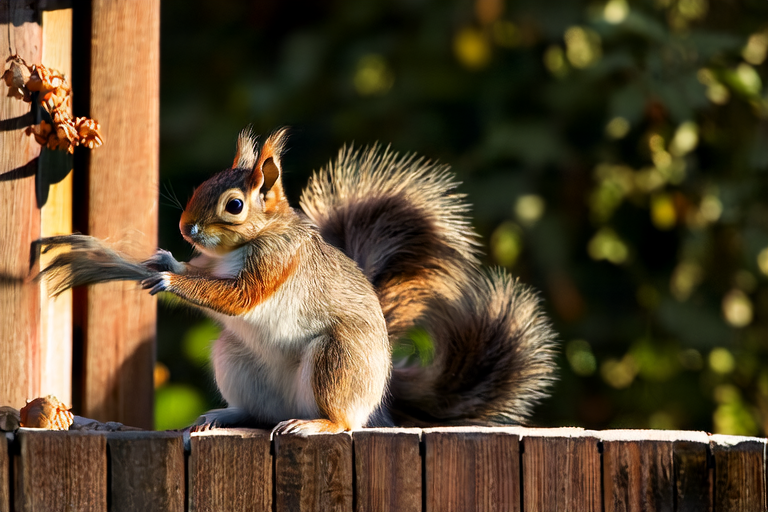The Transformation of Squirrels: From Backyard Visitors to Beloved Furry Friends
Once merely considered pests or nuisances by many, squirrels have gradually transformed into beloved furry friends in the hearts of people across the globe. This evolution is partly due to our growing appreciation for their charming behaviors, surprising intelligence, and remarkable adaptability. Understanding these traits can foster a positive relationship between humans and squirrels, leading to mutual respect and enjoyment. In this article, we will explore the fascinating world of squirrels, highlighting their unique qualities and offering tips on how to attract them safely and ethically to your yard.
Surprising Facts About Squirrel Behavior and Intelligence
Squirrels are often underestimated when it comes to their cognitive abilities. Recent studies have shown that they possess impressive problem-solving skills and memory capacities. For instance, a study published in the journal Animal Cognition demonstrated that gray squirrels could remember the location of hidden caches of food even after several weeks had passed. This ability is crucial for their survival, as they rely heavily on stored nuts and seeds during winter months when food sources are scarce.
Another surprising fact about squirrel behavior is their social nature. While they are typically solitary creatures, they can form complex relationships with other squirrels. A research conducted by Dr. Michael Steele, a professor at Wilkes University, revealed that squirrels engage in play-fighting, grooming, and sharing food with each other. These interactions help strengthen bonds within their community and ensure cooperation during times of scarcity.
Adaptability: The Key to Squirrel Success
One of the most remarkable aspects of squirrels is their incredible adaptability. They have successfully colonized urban environments, thriving alongside humans despite the challenges posed by modern cities. According to Dr. Liana Zanette, a biologist at Western University, squirrels have developed various strategies to navigate human-dominated landscapes. For example, they have learned to cross busy roads by waiting for gaps in traffic, and they frequently exploit human-provided resources such as bird feeders and garbage cans.
This adaptability also extends to their diet. While acorns and nuts are their preferred food source, squirrels are omnivorous and will consume a wide range of plant materials, insects, and even small vertebrates if necessary. Their versatile palate allows them to survive in diverse habitats, from forests to suburban backyards.
Fostering Positive Relationships Between Humans and Squirrels
Understanding the unique qualities of squirrels can greatly enhance our interactions with them. By recognizing their intelligence, social behaviors, and adaptability, we can approach squirrels with curiosity and respect rather than fear or annoyance. This shift in perspective encourages us to create safe and ethical environments where both humans and squirrels can coexist harmoniously.
For instance, providing appropriate feeding stations and maintaining clean areas around these stations can prevent the spread of diseases and reduce conflicts between squirrels and other wildlife. Additionally, planting native trees and shrubs that produce fruits, nuts, or seeds can offer natural food sources for squirrels while enhancing the biodiversity of your yard.
Tips for Attracting Squirrels Safely and Ethically
If you’re interested in attracting squirrels to your yard, there are several safe and ethical ways to do so:
- Provide Nutritious Food Sources: Offer a variety of nuts, seeds, and fruits in sturdy feeders designed specifically for squirrels. Avoid using commercial mixes that may contain fillers or unhealthy ingredients.
- Create Sheltered Areas: Install nesting boxes or leave dead trees standing to provide shelter for squirrels. These structures offer protection from predators and harsh weather conditions.
- Plant Native Trees and Shrubs: As mentioned earlier, planting native plants that produce edible fruits, nuts, or seeds can attract squirrels naturally. This approach promotes ecological balance and supports local ecosystems.
- Ensure Safety: Position feeders and nesting boxes away from areas frequented by pets or children to minimize potential conflicts. Regularly clean feeding stations to prevent the spread of disease.
By following these guidelines, you can enjoy watching squirrels in your yard without compromising their well-being or disrupting the natural environment.
Scientific Studies and Expert Opinions Supporting Squirrel Uniqueness
Several scientific studies and expert opinions highlight the unique qualities of squirrels. For example, a study published in the Journal of Comparative Psychology found that eastern fox squirrels could solve complex puzzles to obtain food rewards. This experiment demonstrated their problem-solving capabilities and reinforced the notion that squirrels are intelligent creatures capable of learning and adapting to new situations.
Dr. Robert Lingle, a behavioral ecologist at the University of Alberta, emphasizes the importance of studying squirrel behavior to better understand animal cognition. He argues that squirrels serve as excellent models for investigating memory, decision-making, and social dynamics in wild animals. By examining these aspects of squirrel behavior, researchers gain valuable insights into the evolutionary processes that shape animal intelligence.
Personal Anecdotes Illustrating the Bond Between People and Squirrels
My neighbor, Sarah, once shared an unforgettable story about her relationship with a local squirrel named “Charlie.” Charlie would visit her backyard regularly, and over time, he became comfortable enough to eat directly from her hand. One day, while Sarah was sitting outside, she noticed Charlie approaching her with a small twig in his mouth. To her surprise, he gently placed the twig beside her before scampering off. Sarah believes this gesture was Charlie’s way of showing gratitude for the food she provided him.
Another friend, Mark, recounted a similar experience involving a pair of squirrels he affectionately called “Buddy” and “Suzie.” These two squirrels would frequently visit his balcony, and Mark took great pleasure in observing their playful antics. One evening, Buddy and Suzie engaged in a game of tag, chasing each other around the railing and leaping onto nearby branches. Mark marveled at their agility and coordination, realizing just how much joy these small creatures could bring into his life.
These personal anecdotes illustrate the deep connections that can form between people and squirrels. By fostering positive relationships with these intelligent and adaptable animals, we enrich our own lives while contributing to their well-being.
